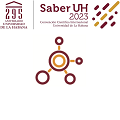Ponente
Descripción
SARS-CoV-2 has resulted in millions of deaths and caused great economic damage worldwide. The disease prevention has focused on massive vaccination. Although some therapeutic treatments have been identified, their clinical efficacy is poor or requires that they be administered within a small treatment interval, so continued research into new therapies is essential. Like other coronaviruses, SARS-CoV-2 encodes a protease (3CLpro or Mpro) that processes its polyproteins, which are indispensable in the viral maturation and replication cycle[1]. Therefore, the 3CLpro protein is a key drug target in the search for new treatment strategies for COVID-19. As new drug discovery and development remains very costly and time-consuming, drug repositioning is a low-risk, high-reward alternative strategy. We performed a high-throughput virtual screening to a database, downloaded from CheMBL, of 6800 molecules currently used as drugs. We created a structure-based pharmacophore model from the crystallographic of protein-ligand complexes of known inhibitors [2]. Using this model the drug database was filtered leading to total of 200 molecules for further analysis. Molecular docking guided by the pharmacophore model followed, and the molecules where order according to the binding energy. As results we obtained compounds that have been studied experimentally in the past, and shown good inhibition against Mpro (e.g. DANOPREVIR, ASUNAPREVIR)[3]. Three molecules with the best ligand-efficiency (AZD-1656, PICTILISIB, LY-2608204) where selected for molecular dynamics studies in order to evaluate the binding stability over time. This work provides a starting point to design a new inhibitor with better binding affinity using a Hit2lead refinement.

